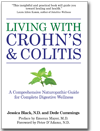“What goes around comes around . . .” may actually be an old proverb meaning “the status eventually returns to its original value after completing some sort of cycle”. . . . Or, “a person’s actions, whether good or bad, will often have consequences for that person.”
I am thinking about that old saying a lot lately, due to the news that I have a severe recurrence of Crohn’s disease. Crohn’s can be found anywhere in the intestinal tract, from the mouth to the anus, but it usually presents in the terminal ileum, as it did in my case. Since I no longer have the 20 centimeters of terminal ileum (or the ileo secel valve that links it to the large colon), I now have the spread of the disease on the other side of my sutchers…. 20 more centimeters of small bowel are severely inflamed. For the record, that is a total of almost 2 feet, 20cm being around 8 inches. Here is a good definition:
The small intestine (or small bowel) is the part of the gastrointestinal tract following the stomach and followed by the large intestine, and is where much of the digestion and absorption of food takes place. The primary function of the small intestine is the absorption of nutrients and minerals found in food. The average length of the small intestine in an adult human male is 6.9 m (22 feet 6 inches), and in the adult female 7.1 m (23 feet 4 inches). It can vary greatly, from as short as 4.6 m (15 feet) to as long as 9.8 m (32 feet).[3][4] It is approximately 2.5–3 cm in diameter. The small intestine is divided into three structural parts: Duodenum, Jejunum, and Ileum.
The small intestine is where most chemical digestion takes place. Protein, lipids (fats) and carbohydrates are broken down and a process called diffusion takes place where nutrients are absorbed into the blood vessels through the wall of the small intestine (the terminal ileum is where the B-12 and bile salts are specifically absorbed). There are all sorts of mucosa and wrinkly tissue down there—hence the language from my latest colonoscopy had terms like “serpentine” to describe the tracks of inflammation they found). There is a lot going on in the bowel—the second brain—including the delicate villi, which is Latin for shaggy hair (I love these descriptions!).
Do you have Crohn’s or uc?
If so, we have even more in common! Interestingly, I keep my book off my Facebook personal page—not to hide my disease, but to not “promote” my book, for fear people will think I am only selling a medical memoir written with a naturopathic doctor to make money (not!!).
Maybe I should become brave like Mike McCready, and be even more open….in this teeny tiny post, I will explain that I have lived with this sucky disease since I was in college, and was only diagnosed when I was forty.
When I turned 50, I lost a significant portion of both large and small bowel, and I have enjoyed a great quality of life ever since my surgery—pain-free! What a joy to have my life back!!! I take nothing for granted, and I wake up each and every day feeling blessed and lucky (I’m Irish), and I do not like to listen to self-absorbed people talk on and on about, you know….. Anyway, as I was sayin’ …. My book is ranked number 11 on Amazon in disease, and consistently No. 1, 2, or 3, in Kindle’s Gastroenterology ranking. Many people actually write to me and say thanks—the greatest gift in the world! I want to say “thank you” to my readers, my friends, and all of the community—anyone who has struggled with disease, or losing a loved one—we are all connected!
What does Karma mean?
A Sanskrit word, and one from Hindu-Buddhist religious traditions, it means that “the total effect of a person’s actions and conduct during the successive phases of his existence, regarded as determining his next incarnation.” I don’t know about you, Dear Reader, but I am ready for this cycle of disease to be over!
From the Dalai Lama
Take into account that great love and great achievements involve great risk.
When you lose, don’t lose the lesson.
Follow the three R’s:
– Respect for self,
– Respect for others and
– Responsibility for all your actions.
Remember that not getting what you want is sometimes a wonderful stroke of luck.
Learn the rules so you know how to break them properly.
Don’t let a little dispute injure a great relationship.
When you realize you’ve made a mistake, take immediate steps to correct it.
Spend some time alone every day.
Open your arms to change, but don’t let go of your values.
Remember that silence is sometimes the best answer.
Live a good, honorable life. Then when you get older and
think back, you’ll be able to enjoy it a second time.
A loving atmosphere in your home is the foundation for your life.
In disagreements with loved ones, deal only with the current situation. Don’t bring up the past.
Share your knowledge. It is a way to achieve immortality.
Be gentle with the earth.
Once a year, go someplace you’ve never been before.
Remember that the best relationship is one in which your love for each other exceeds your need for each other.
Judge your success by what you had to give up in order to get it.
If you want others to be happy, practice compassion.
If you want to be happy, practice compassion.






